In Japan, foreigners can also participate in blood donation.
However, because the instruction manual is only in Japanese and the process also includes many steps, for those of you who are donating blood for the first time, you may encounter many surprises.
“You want to donate blood but don’t know if you are eligible to donate blood?”
“Want to know what the blood donation process is like in Japan?”
“Want to find a place where you can donate blood in Japan?”
This article will answer all of the above questions based on the information on the official website of Japan Red Cross Society.
If you also have similar questions, be sure to consult them.
People who can’t donate blood

- People undergoing dental treatment leading to bleeding in the past 3 days
- Newcomers from abroad entering Japan in the past 4 weeks
- Person with body piercing in the past 1 month
- People who got tattoos in the last 6 months
- People who are pregnant or breastfeeding
- People infected with HIV
- People who have had sex with a new or anonymous partner within the last 6 months
- Be a man and have had sex with another man in the past 6 months
- People who used drugs or stimulants in the past 6 months
- Person who has had sexual relations with a person in case number 7, 8, 9 in the past 6 months
- People who have had blood transfusions (of other people), tissue or marrow transplants, injections with human placenta extract
- People who have had syphilis, hepatitis C, malaria or Chagas disease
- People who have just left Central and South American countries (excluding Caribbean countries but including Mexico) less than 6 months
- People infected with Zika virus but the course of treatment is less than 1 month
In addition, in the following cases, you need to tell the nurse before donating blood:
- Have you taken medication or had any side effects in the past 3 days?
- Vaccinated within the past 1 year
- Been abroad (except Europe, USA, Canada) within the last 3 years
- Have stayed in Europe or Saudi Arabia for more than 1 month after 1980
In addition to the above cases, depending on your health condition that day and the doctor’s preliminary diagnosis, there may be times when you will not be able to donate blood.
On the other hand, because the document is only in Japanese and the nurse also explains it in Japanese, if you can’t understand Japanese to a certain extent, it may also be rejected.
Types of blood donation
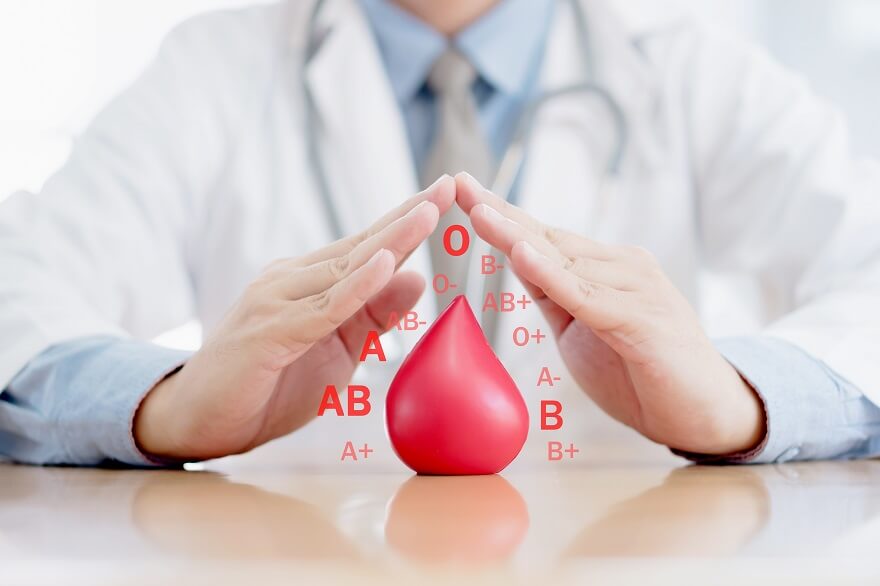
When you go to donate blood in Japan, you will be able to choose between “whole blood donation” and “blood component donation”.
Whole blood donation
- It is a method of donating all blood components.
- You can choose to donate 200ml of blood or 400ml of blood.
- Basic criteria of blood donors:
| 200ml | 400ml | |
|---|---|---|
| Age | 16~69 years old | Male: 17~69 years old Female: 18~69 years old |
| Weight | Men: over 45kg Female: over 40kg | Over 50kg |
In addition to the above criteria, blood donors also need to meet the standards of blood pressure, heart rate, body temperature … measured on the day of blood donation.
Donating blood components
- A method of donating only platelets or plasma in the blood using a dedicated separator.
- Less stressful on the body than whole blood donation.
- Basic criteria of blood donors:
| Plasma Donation | Platelet donation | |
|---|---|---|
| Age | 18~69 years old | Male: 18~69 years old Female: 18~54 years old |
| Weight | Men: over 45kg Female: over 40kg | Men: over 45kg Female: over 40kg |
In addition to the above criteria, blood donors also need to meet the standards of blood pressure, heart rate, body temperature … measured on the day of blood donation.
Things to do before donating blood

To ensure your safety as well as make sure the blood donation process goes smoothly, please note the following points before donating blood.
- Get enough sleep (at least 5 hours) the night before
- Don’t let your stomach go hungry
- Don’t eat greasy foods
- Do not smoke
- Do not drink alcohol or drink dairy products
In short, keep your body in top condition before donating blood.
Blood donation process in Japan
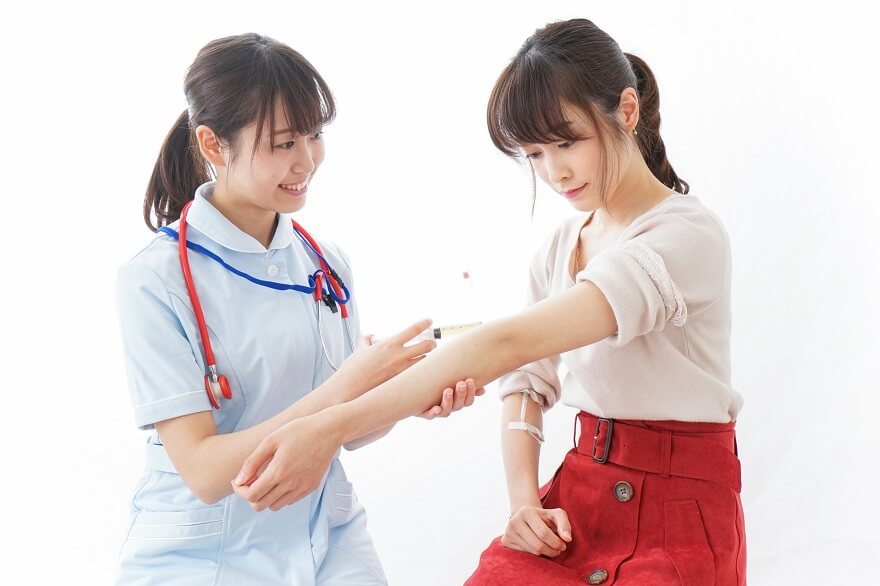
Sign up to donate blood
You need to present an identification document with a photo such as a passport, alien card or My number card…
Next, you will be given a “Consent form for donating blood” (献血の同意説明書) which clearly outlines the side effects of blood donation and the purpose for which the blood is to be used…
You must read, understand and accept the contents of the paper before you can register to donate blood.
Details of “Consent form for donating blood”: click here.
Answer the questionnaire
You will be given a “Questionnaire” (問診表) containing questions about your health and medical history.
The questionnaire is designed in the form of “Yes” & “No” answers and you only need to circle the content you want to answer.
Please read carefully and answer honestly so that blood donation is safe for both you and the recipient.
Details of the “Questionnaire”: click here.
Health check
You will be directed to see a doctor and will be asked a number of health-related questions based on the answers to the “Questionnaire” in the step above.
If your doctor confirms you meet the blood donation criteria, your blood pressure and body temperature will be measured.
Measurement of hemoglobin/preliminary blood group test
You will be measured to see if your hemoglobin levels meet the blood donation criteria and have a preliminary blood group test.
In the case of choosing the method of “donating blood components”, the platelet count is also measured.
Note: the disinfectant used contains iodine.
If you have an iodine allergy, tell your nurse to get another disinfectant.
Blood Donation
Lie on the designated bed for the nurse to draw blood.
Depending on the method of blood donation, the time to donate blood will vary.
- Whole blood donation: about 10~15 minutes
- Donating blood components: about 40~90 minutes
Rest after donating blood
After donating blood, you will be asked to sit back for at least 10 minutes to monitor your health.
If you must drive (including a bicycle), sit back for at least 30 minutes after donating blood.
Get your Kenketsu Kādo card and leave
Kenketsu Kādo is a card for those who have participated in blood donation.
On the Kenketsu Kādo card, there will be information on the name, code of the blood donor, blood donation history and when the next blood donation can be made.
Just bring this card when you go to donate blood next time, the procedure will be much simpler.
Notes after donating blood

After a short break at a blood donation center, your body may not have fully recovered.
Therefore, after leaving the blood donation center, you need to note the following:
- Drink a lot of water
- If traveling by train, wait for the train at a place away from the tracks in case you get dizzy and fall onto the tracks.
- Do not shower for 2 hours after that
- No sauna during the day
- Do not smoke, do not drink alcohol, do not exercise vigorously right after donating blood
If you feel unwell, immediately call the blood donation center for support.
(The phone number of the nearest blood donation center is printed on the Kenketsu Kādo card)
Announcement of blood test results
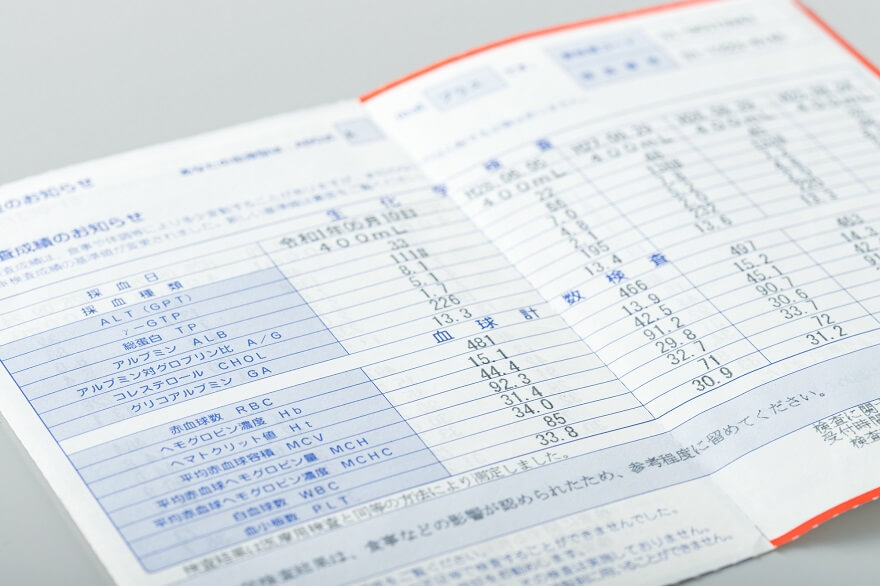
To thank you for your cooperation in donating blood, the blood donation center will notify you of your blood test results by post.
Results include:
- 7 biochemical test results and 8 blood cell count test results:
- Results will be announced within 2 weeks from the date of blood donation.
- You can compare your stats with the normal stats listed in each section.
- Test results for hepatitis B, hepatitis C, hepatitis E, syphilis, HTLV-1 antibodies:
- Notification of results after 1 month from the date of blood donation.
- Only report results for cases with unusual indicators. For those who are negative (not infected), there will be no notification.
Note that blood test results are only announced when you have a need to know.
Before the blood draw, the nurse will ask if you would like to receive the results of the blood test.
In case you want to receive the results, please answer yes.
Blood donation locations in Japan
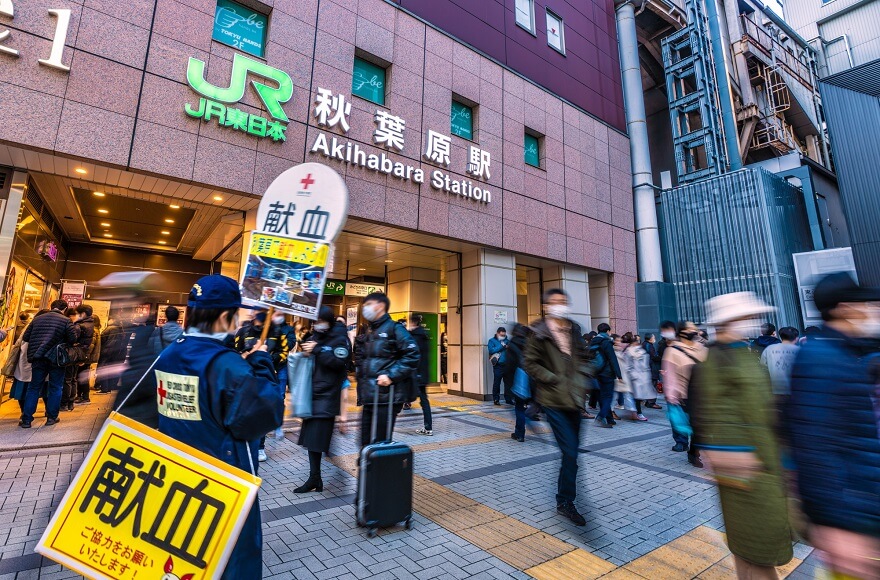
There are many places to accept blood donations in Japan, most of them are concentrated in large stations with high traffic.
Besides the fixed blood donation centers, there are also mobile blood donation buses in Japan.
You can refer to the following link to find the nearest blood donation center and specific working hours.
- List of blood donation centers: https://www.jrc.or.jp/about/search/bloodroom/
- List of mobile blood donation buses: https://www.jrc.or.jp/donation/bus/
Some blood donation centers or blood donation buses also have a “Reservation” mode for the convenience of blood donors, but booking in advance is not required, so you can just come in person.
In addition, to attract more blood donors, some blood donation centers also organize events such as palm readings, Tarot readings, child care while parents donate blood…
If there are interesting events at the blood donation center you come to, you should also try it out!
Conclusion
Not understanding the process may have made you hesitate to donate blood even though you really want to, but through this article, you must have had a clearer view of the blood donation process in Japan, right?
In case you decide to donate blood, please refer to the “Consent form for donating blood” (献血の同意説明書) and “Questionnaire” (問診表) mentioned in the article to procedures can be carried out as smoothly as possible.
And don’t forget to rest well before and after donating blood to recover quickly.

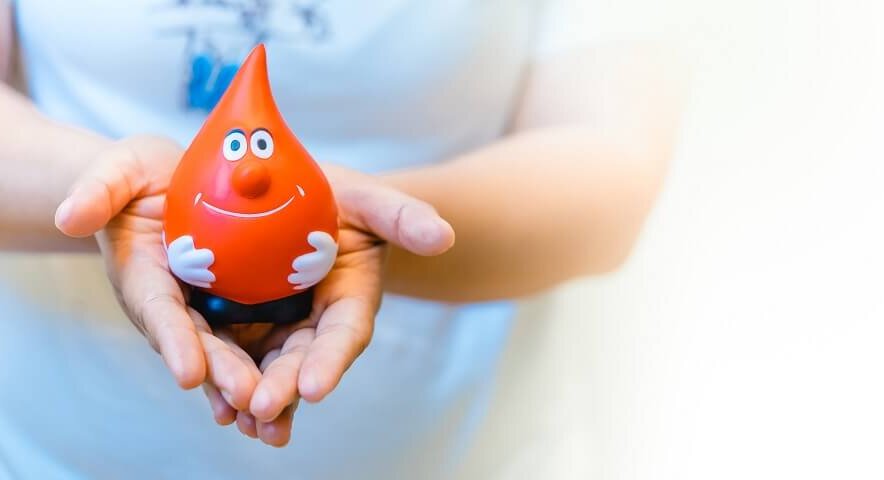
Comment